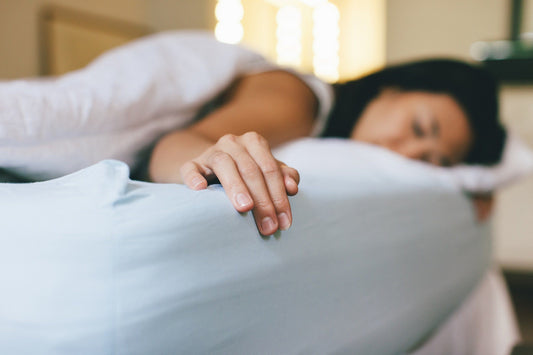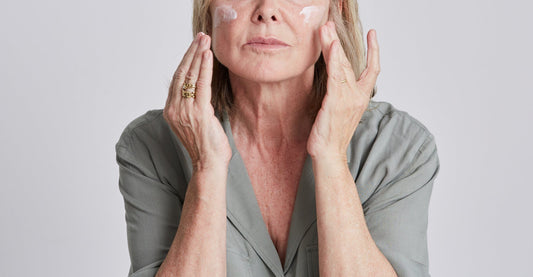Want to print this article for later? Click here.
Perimenopause, or the time leading up to menopause, is a transitional period for many women. Hormones begin to fluctuate, which commonly causes the onset of symptoms such as hot flashes, mood swings and menstrual irregularities.
Another symptom that’s common — but not as commonly discussed — is a change in sexual desire or your perimenopause sex drive – specifically a sudden increase in libido. While some women struggle with a decline in their sex drive during perimenopause and menopause, others may actually notice increased libido after menopause or during. Understanding perimenopause increased libido, as well as what is going on to cause this shift, may help you embrace your growing appetite for sexual intimacy.
Hear more from Bonafide Chief Medical Officer, Dr. Alyssa Dweck on why increased sex drive may occur during perimenopause and what you can do about it, below:
Perimenopause and Increased Libido
While many perimenopause symptoms are associated with fluctuating hormones, that’s not necessarily the case with changes in sexual desire and drive, according to OBGYN, Dr. Suzanne Hall. “Most of the libido is surprisingly not directly related to our hormonal state,” Dr. Hall says. “As we enter into perimenopause and menopause, what affects our libido the most dramatically are psychosocial factors.”1
Shifting attitudes around self-esteem and relationships, potentially less work- and parenting-related stress, and more time to pursue what makes them happy are just a few of the factors that may give women the freedom to appreciate intimacy in new ways, Dr. Hall explains.
Changes that can have a psychosocial impact on a woman’s life — and a woman’s sex drive after 50 may include:
Fewer Caretaking Responsibilities May Contribute to Increased Perimenopause Sex Drive
The age at which many women approach perimenopause may coincide with a time when their children are getting older, and therefore require less care. “As our kids get older, our level of fatigue and stress from child-rearing and family-raising may begin to lessen,” Dr. Hall says. “This allows for more time to address partnerships, intimate relationships and sexual time.”
This rekindling of intimacy between partners may reach its peak after kids leave “the nest” for college or other adventures; research even shows marital satisfaction improves when children move away from home.2 If a woman happens to be in perimenopause or menopause as her nest empties, she may notice a sudden increase in her libido or sexual desire.
An increased libido in women doesn’t just happen for those who are married during perimenopause, either. According to Dr. Hall, women starting new relationships, perhaps due to divorce or loss of a partner, can also experience a surge in their sex drive in perimenopause. “Research shows3 improved sexual functioning and increased libido in perimenopause due to new relationships,” she says.
Improved Self Esteem Can Influence Increased Libido in Perimenopause
“Body image is a big factor in how our libido functions,” says Dr. Hall. When we feel good about ourselves, we may feel more comfortable in the bedroom — and many women find themselves feeling more confident about their bodies as they age.
A massive 2018 analysis of 191 research articles about self-esteem that included data from almost 165,000 people found self-esteem increases gradually throughout middle age before peaking at age 60.4 A more recent study published in the journal Body Image, confirmed this research for women in particular, finding that their self-esteem increased with age and was highest at 60 years old.5
For women who are in perimenopause or menopause, Dr. Hall explains, newfound body confidence could lead to fewer inhibitions (and greater desire) when it comes to sex.
Less Stress at Work May Contribute to Increased Perimenopause Sex Drive
Just as fewer family responsibilities may allow a perimenopausal woman to strengthen intimate connections, so might less stress at work. While it’s certainly not true for everyone, Dr. Hall suggests that perimenopause may happen during the time in a woman’s life when her career is peaking. A stable, not-overly-taxing position at work may allow more time and energy (both physical and mental) to devote to intimacy.
This suggestion makes sense given the toll work stress can take on sexual desire. A 2019 study found 51% of respondents reported they weren’t having sex with their partners because their jobs caused them so much stress.6
Is High Libido in Women During Perimenopause Ever a Problem?
There’s no such thing as “normal” when it comes to sex drive or sexual desire, meaning an increased libido during perimenopause is only a problem if it’s a problem for you (or your partner). Although she doesn’t encounter many patients who complain about an increased libido, Dr. Hall says that if high perimenopause sex drive is affecting your quality of life — if it’s causing problems in your relationship, or if you’re putting yourself in unsafe situations — you should talk to your healthcare provider who may be able to refer you to a sex therapist who specializes in this area.7
It’s also important to remember that you can still get pregnant during perimenopause, so be sure to continue using contraception until you’ve gone through menopause (12 months without a period).8
Resources:
- https://pubmed.ncbi.nlm.nih.gov/21143419/
- https://journals.sagepub.com/doi/abs/10.1111/j.1467-9280.2008.02222.x
- https://www.psychologytoday.com/us/blog/slightly-blighty/201508/why-new-partner-boosts-your-sex-life
- https://psycnet.apa.org/fulltext/2018-33338-001.html
- https://www.sciencedirect.com/science/article/abs/pii/S1740144521000966
- https://globalnews.ca/news/6563889/stress-libido-sex-drive/#:~:text=Stress%20can%20increase%20the%20production,bedrooms%E2%80%9D%20because%20of%20work%20stress
- https://www.healthline.com/health/high-libido#possible-causes
- https://pubmed.ncbi.nlm.nih.gov/23932427/









Comments
Post commentIt brought me to tears when I thought something was wrong with me until I found this article. The comments are what helped me most. I agree with everything about the non stop need to be satisfied and the all day pulsing vagina and constant thoughts of sex but the thing that I didn’t see comments on was the overall feeling of myself. I feel like all of a sudden I am a confident and sexy woman. I feel like before I wasn’t fully myself like some part was locked away and it was just suddenly unlocked. I feel so alive and passionate. I am now confident enough to tell my husband my needs in bed and talk dirty and Although part of this change is terrifying and a bit disturbing I feel like I am complete and I don’t want this feeling to ever end. The only problem is my husband is so thrown off. We went from me not wanting sex or even snuggling to me needing to be touched and to touch and not always in a sexual way.
Thank you SO MUCH for this – especially the comment thread. I am definitely feeling freakish having had a low sex drive most of my life. It is almost uncontrollable now (age 49). What’s ironic is that I’m divorced and have been seeking an ‘outlet’ but the men I’ve hinted (not at all subtly) to all want “long term relationships”. UGH! How the tables have turned!
I totally agree with mindovermatter’s comment! I’m going to be 47 and I had blood work to confirm I’m in menopause. I have no biological children so I heard it’s normal to go through the change at a earlier age. At first I couldn’t handle the weight gain and bouts of depression. I haven’t had a period since 2020. I could go weeks without sex ( I never thought of myself as a overly sexual type of person). I couple of weeks ago it’s like a switch flipped. I constantly feel aroused down there, I’m very moist and I constantly think about being with my hubby. I thought something was wrong with me!!!! I now accept my 20 lb weight gain and feel sexy and confident despite the extra weight. I feel guilty that I’m wearing my hubby out. At first he loved it but now I feel he doesn’t know how to handle it. I have to tell myself to stay districted and know this is just a phase. I’m glad I found this sight as my ob-gyn doesn’t take enough time to answer these types of questions. I really wasn’t sure whom to discuss this with. I’m glad to know I’m not alone!
I’m not buying the psychological explanation either. My work stress is extremely high, I have a young teenager causing me anxiety and finances are still tight. I’m ok with my body image and aging, but not thrilled. My libido has been low for 20 years due to Hashimoto’s with a significant improvement during pregnancy. So, this year or so of perimenopausal sex surge has been a drastic change. I too have more sympathy for hormonal teenage boys. Unfortunately, my wife is going from a PCOS high libido to the usual perimenopausal low libido. So, we’ve swapped roles.
This is a rare article on THIS topic! All the others address decreased desire and activity. I found my sexual desire increasing steadily as I progressed through my 40s and 50s, with a desire for more exploration including tantra.
I thought it was all innate and physical — having more testosterone perhaps. But after reading this, I now think it’s as much situational — child off to college, out of a longstanding bad relationship where sex was the only panacea, to being in a new relationship and going to the gym often to restore my well-being and physical integrity.
I also seriously can’t say enough just how impactful having trifocal lens implants in my eyes at 54 transformed me in every way. I will never need glasses again. I feel like I’m in my 30s! I’m motivated to do everything within reason and budget to restore my physicality, appearance and mental peace.
It’s a wonderful time to enjoy life, and try new things with someone in a similar frame of mind.